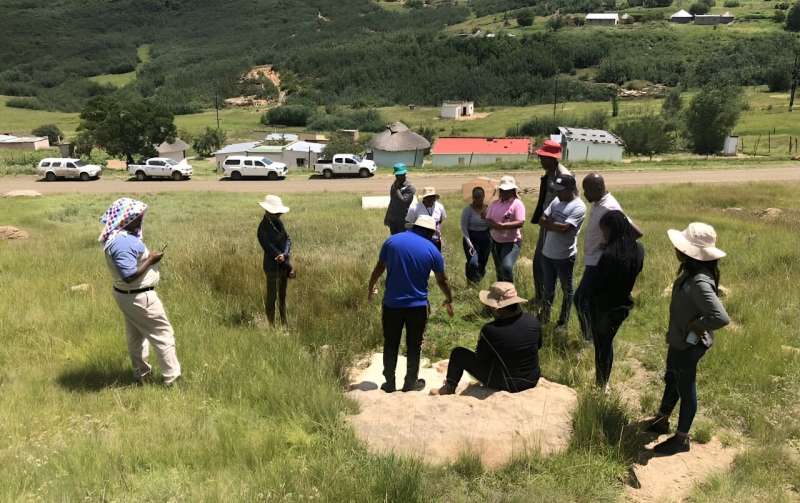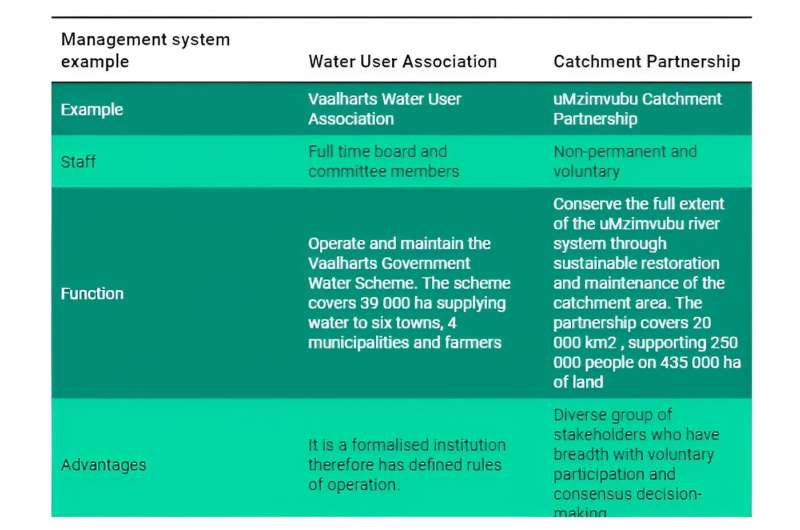This article has been reviewed according to Science X's editorial process and policies. Editors have highlighted the following attributes while ensuring the content's credibility:
fact-checked
trusted source
written by researcher(s)
proofread
South Africa's scarce water needs careful management—study finds smaller, local systems offer more benefits

South Africa is a water-scarce country, the 30th driest in the world. Using water wisely will become more and more important as the population grows and droughts related to climate change increase. A lack of clean, fresh water has a negative impact on people's health and on the amount of food that can be grown.
Agricultural economist Saul Ngarava studied 1,184 homes in South Africa's North West, Northern Cape and Eastern Cape provinces to see which types of water governance resulted in better water, energy and food security. He found that the best results were achieved where water was governed democratically by different types of organizations working together.
How is water governed in South Africa?
Water governance is driven by the constitution, which says "Everyone has the right to have access to sufficient food and water," and which gives different water management responsibilities to different levels of government.
At one end of the spectrum, national government manages all water resources. At the other end, local government takes care of supplying clean water to households and disposing of sewage and waste water.
The National Water Act of 1998 is charged with managing South Africa's scarce water resources through different local level institutions. These are catchment management agencies, water user associations, international engagement bodies and the Water Tribunal.
The Water Services Act of 1997 says how these institutions should make sure that everyone has access to basic water and sanitation.
Why do water use governance arrangements matter?
Water supports development and can help with creating jobs and eliminating poverty. It is essential in national planning and therefore it is vital that it is managed properly.
In South Africa, there are different water governance arrangements: bottom-up and top-down. The two I have researched are the water user association and the catchment partnership.
There are 43 water user associations in South Africa—formal, top-down associations of individual water users. An example is a large scale irrigation scheme that provides water to commercial, emerging and small-scale farmers and their local towns and villages in major agricultural areas. I researched the Vaalharts water user association, which covers the farming areas of Taung and Magareng, stretching across the North West and Northern Cape provinces.
Water user associations usually have a lot of infrastructure. This can include 100 kilometer long irrigation canals and pipelines. They're mainly centered on commercial farmers who use this common irrigation system, and although they deliver water to all homes in the farming area, they are largely dictated to by farmers.
A catchment partnership is a ground-up, informal voluntary collaboration between multiple organizations with shared interests. I researched the Umzimvubu Catchment Partnership in Matatiele, in the Eastern Cape province. It is made up of more than 30 organizations, including the local municipality, the non-profit Environmental Rural Solutions, the provincial forestry department and the South African National Biodiversity Institute, an academic research institute.
These organizations work together to build social capital—the resources linked to a network of relationships. The network is a convergence of indigenous knowledge, expertise and data, aimed at empowering all the participants to take equal ownership of the water governance arrangement.

Catchment partnerships usually serve only a smaller area and everyone who lives within it. They often aim to conserve a river system and its catchment area so that the water can be used for local job creation and economic growth.
They don't have as much expensive water infrastructure and they rely on natural benefits—water from natural springs, food from wild fruit or fuelwood that is used for cooking.
Are these arrangements unique to South Africa?
Water user associations and catchment partnerships are not unique to South Africa. England, Scotland, Tanzania, Nepal and Indonesia, among others, also have them. In these countries, water user associations and catchment partnerships have resulted in water management by a wide range of organizations and they face many of the same issues.
What problems can arise in water governance?
Water user associations such as Vaalharts water user association take more time to make decisions. Technical experts in finance, human resources, engineering, and others need to be consulted, along with subcommittees who add their voices, and even the government's Department of Water and Sanitation.
This means that infrastructure maintenance and agreements on how to distribute water fairly among the farmers, industry, towns and communities can be slow or not happen at all.
In catchment partnerships such as the Umzimvubu catchment partnership, grassroots and local organizations aim to work together to reach consensus.
This makes decision making faster, easier and more effective. However, they lack funding, mostly because they are made up of organizations without large funding bases. Sometimes, their member organizations take care of their own water needs first before considering the partnership.
What impact do these arrangements have on water, energy and food security?
My research found that the Vaalharts water user association solely focused on water security. But this mainly benefited the commercial farmers who grow cash crops such as pecan nuts, lucerne, groundnuts, wheat, citrus and grapes.
My research found that people living in the Umzimvubu catchment partnership have more water, energy and food security overall. For example, the households I studied in the Umzimvubu catchment partnership were able to supplement their water supply with clean drinking water from a spring that the catchment partnership had restored and protected. The catchment partnership also tested the quality of the water and set up tanks to store it, providing clean, free, drinking water to over 700 people.
A limited amount of water was also available for their livestock. This improved the food security of homes in the Umzimvubu catchment partnership area. Free water meant the families had more money to buy electricity.
The catchment partnership had projects to clear away invasive trees which drain local water supplies. This helps rejuvenate the natural grasslands, where livestock graze. This creates more food security.
What changes do you propose, and why?
The South African government wants to establish more high level water governance structures such as water user associations. Based on my research comparing the Vaalharts water user association and Umzimvubu catchment partnership, this is the wrong approach.
Top-down structures that restrict broad participation, and increase bureaucracy and corruption, might not be able to provide the water, energy and food security that South Africa needs. An effective change would be to disband water user associations and replace them with catchment partnerships.
Provided by The Conversation
This article is republished from The Conversation under a Creative Commons license. Read the original article.![]()



















